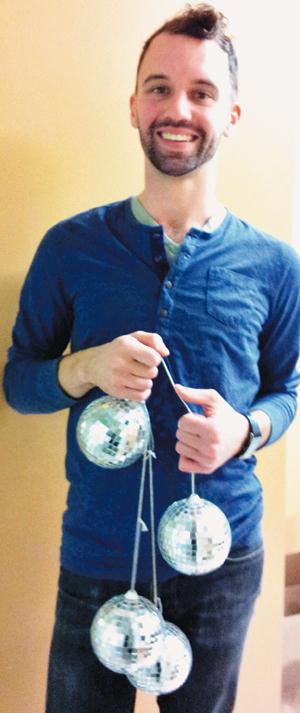The AIDS Committee of Ottawa (ACO) hopes to help the city’s gay men beat the winter blahs when its seventh annual health and wellness festival, Snowblower, kicks off Feb 7.
The social and educational 11-day event celebrates male sexuality and strives to promote harm reduction in the queer community. The festival began in 2007 as a response to research that had identified a community need for events that cater to gay men’s health.
Nick Valela, ACO’s gay men’s health and wellness coordinator, says that while men’s sexual health is a large part of Snowblower, the festival demonstrates there is more to gay men than STI prevention.
“If you look at the history of gay men’s health, oftentimes it’s been focused on HIV and AIDS,” Valela says. “Not only for gay men locally or gay men in isolation, but also the rest of society. That’s what we’re trying to do. We’re trying to show through different events that . . . [gay men are] more complex than that.”
This year, the Snowblower team is aiming to increase community participation in HIV prevention and other wellness initiatives, reduce rates of HIV and STI infection, and engage gay men in improving their own health.
“We’re hoping to decrease levels of social isolation, which has become more and more prevalent in gay men today,” Valela says. “We’re hoping that gay men will take more of an interest and become more engaged in their own health and wellness.”
On Monday, Feb 11, Ian Carter, who defended Steven Boone in his HIV nondisclosure trial, and Mark Tyndall, head of the infectious diseases department at the University of Ottawa, who testified in Boone’s defence, will speak at a Snowblower event called Gay Men, HIV and the Law: Where Do We Go from Here?
Patrick O’Byrne (Faculty of Health Sciences, University of Ottawa) and Brent Bauer (Mayo Clinic) will join Carter and Tyndall to weigh in on the recent Supreme Court decision regarding HIV transmission.
“We’ll have presentations by each of these four presenters, then we’re going to break out into sessions led by these presenters,” Valela says. “This gives the attendees an opportunity to share their opinions on how the Ottawa community can react and what we can do following the Supreme Court decision.”
ACO is eager to analyze the community’s feedback to inform their own work in conjunction with the Ottawa working group on the criminalization of HIV and nondisclosure, Valela says.
Of course, no gay men’s festival would be complete without parties. The first Snowblower party is on Feb 8. Hosted by Sapphire Champagne, the No Pants, No Problem event will allow partiers to check their trousers at the door and engage in oil wrestling if they dare.
Valela calls the event, at Fall Down Gallery, a “sex-positive, underwear dance party.” Additionally, avant-garde artist Nina Arsenault will be on hand for the Snowblown party on Feb 15, at La Petite Mort Gallery.
“Our goal is to build on what Snowblower has been in years past by continuing to offer a wide variety of events we hope will appeal to a broad section of Ottawa’s gay male community,” Valela says.
For a complete rundown of Snowblower events, visit aco-cso.ca/Snowblower.


 Why you can trust Xtra
Why you can trust Xtra


